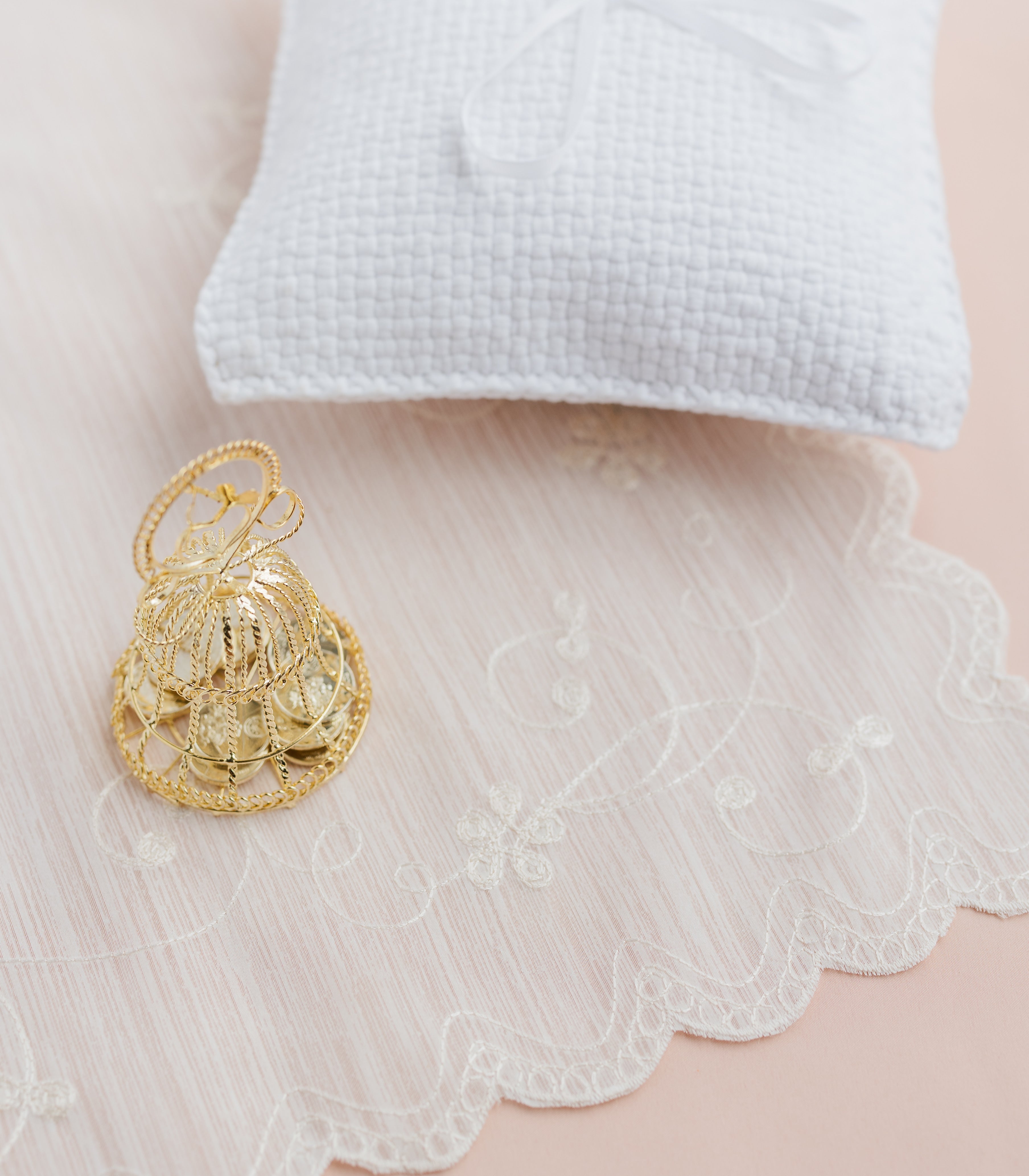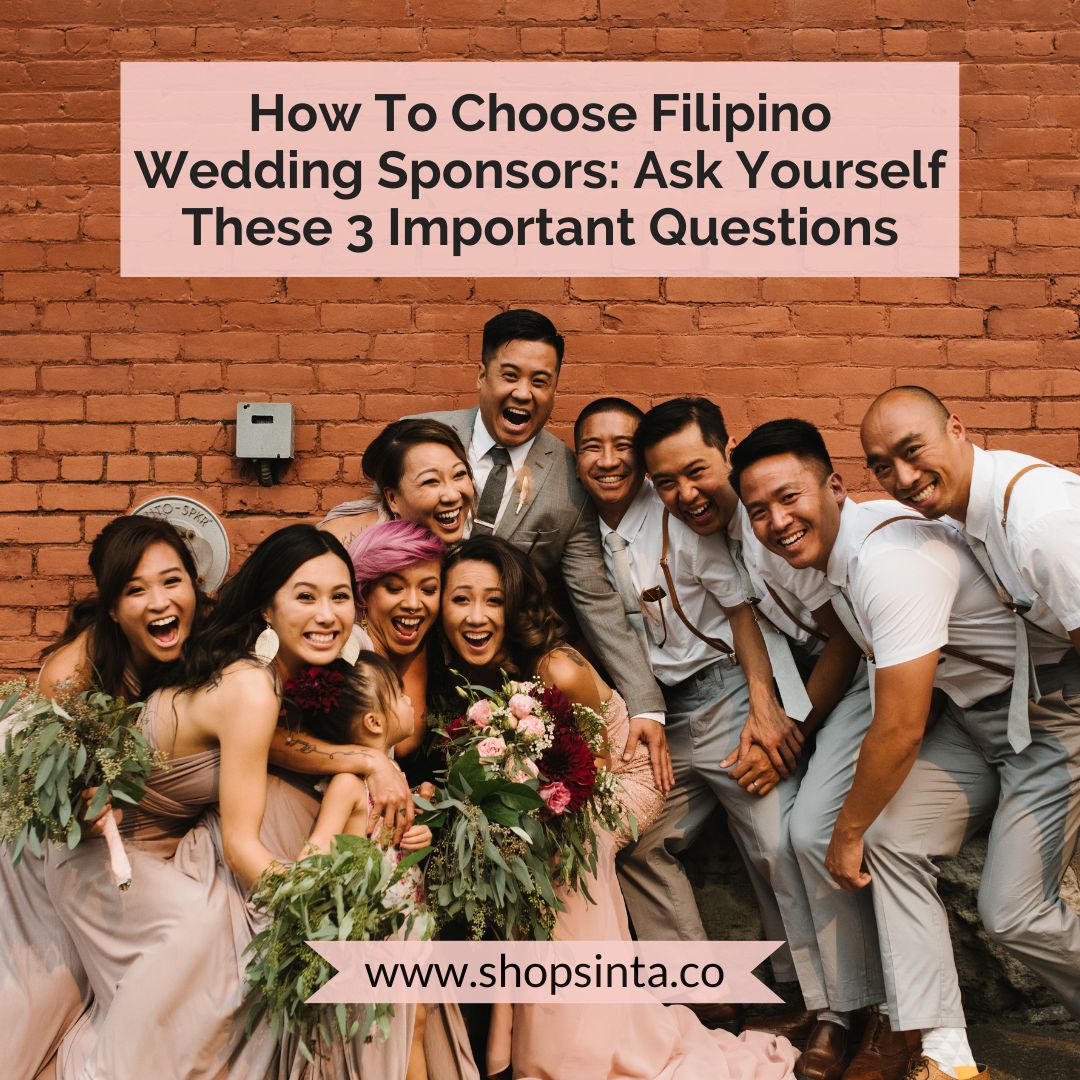In a traditional Filipino wedding, sponsors play an important part. They are often role models the couple leans on for support during their nuptials and throughout their marriage.
Usually, there are principal and secondary wedding sponsors.
Principal or primary sponsors legally witness and sign the marriage certificate. Typically people you admire, couples might ask their ninong (godfather) and ninang (godmother) to take this role.
Meanwhile, secondary sponsors are chosen from the couple's close friends or family. Their roles may include helping with the traditional Filipino marriage rites: candle, coins, cord, and veil.
Sponsors might also make financial contributions for the big day.
Even with these clear distinctions in mind, choosing wedding sponsors can be challenging. Wedding parties differ in size, so there are always options to shift and share responsibilities.
Regardless of what your guest list looks like, here are a few guiding questions to help get you started.
When choosing your Filipino wedding sponsors, ask yourselves: "What life values are important to me and my partner?"
A wedding is highly symbolic, from the moment you walk down the aisle to the last twirl of your money dance.
Filipino wedding symbols of the candle, coins, cord, and veil traditionally represent values rooted in Catholicism. In the candle ceremony, the flame historically signifies the presence of Jesus Christ in a marriage.
The unity cord, also known as a lasso or yugal, resembles an infinity sign which emphasizes life-long commitment. The wedding veil stands for humility and, for Christians, acknowledges the cover of God’s aid. Finally, the coins or arras point to shared wealth and possessions.
More couples are adapting these Filipino wedding customs in non-traditional and non-religious ways. Maybe you and your partner only attribute the candle to unity. The cord could instead symbolize the strength of your bond. The veil can represent the love of your friends and family covering you as a married couple.
The significance of these elements is what you make of it.
Similarly, wedding sponsors can be loved ones who represent values that are aligned with yours as a couple.
- For the principal sponsors, who do you trust to attest to your union (on paper or otherwise)?
- For secondary sponsors, who are the individuals or couples that embody your values?
You can narrow down your list of potential sponsors by drawing up a list of the top ten values that you want to emulate as a couple. Then take some time to reflect on which of your friends and family best align with them.
Of course, it can be daunting to make these decisions when some friends or family have their own expectations. When my parents were getting married, they had to balance their parents’ expectations with their preferences.
Some of their sponsors were relatives, but my parents also compromised where they could.
For their friends, they based their decision on values like compassion, equity, and good parenting. My dad knew he could always count on family friends Carmen and Rick, whose marriage exemplified these values and who he could rely on for advice.
For guests who want to be involved but aren’t your preferred sponsors, you could always offer them a special role. They could read a poem of your choice during the wedding ceremony or even perform a song at the reception. Regardless of the role you offer, they can still be included in a meaningful way.
When choosing your Filipino wedding sponsors, ask yourselves: "Who do we know we can rely on for guidance?"

Because sponsors are trusted members of your social circle, they should be people you can learn from. This is what differentiates wedding sponsors from the person of honor, who are usually friends or relatives who share similar life experience as you.
Many couples, like my parents, choose older couples to be sponsors, since their experience lends to their perspective. However, this doesn’t have to be your standard.
Ask yourselves who you consistently lean on for help and who you would trust with your challenges — if you needed to call someone and talk things through tomorrow, in five years, or in twenty, who would that be?
I recently asked my childhood friend Kaithlyne, who is getting married this summer, how she and her fiancé decided on their sponsors.
She told me, “Daniel and I wanted to be very intentional with the people we chose as ninongs and ninangs. We chose people who saw us grow as a couple. We chose people who we would feel comfortable enough to go to when it comes to marriage advice.”
When choosing your Filipino wedding sponsors, ask yourselves: "Who can we celebrate every aspect of ourselves with?"
Let’s talk logistics — couples often ask how many sponsors they should have. For many Filipino weddings, there are two primary sponsors and two secondary sponsors per ceremony element, excluding the one coin bearer. For example, you would have two for the cord ceremony, two for the veil ceremony, et cetera.
However, that number can vary and so can the make-up of your sponsors depending on your wedding. Sponsors can perform double-duty and share responsibilities. You can have only two sponsors drape both the cord and the veil for your ceremony.
Regardless of how many wedding sponsors you enlist, they should celebrate you for all you are, including your Filipino heritage.
Your sponsors might be Filipino, and like you, are learning more about their heritage. Your wedding can be one way to share in that experience. Conversely, your sponsors may not be Filipino but are happy to learn more about what this means to you and your partner.
For my Ate Kaithlyne, it was important to her and Daniel to choose people they genuinely could be their authentic selves with.
She shared with me: “The people we chose really hold a dear place in our hearts because of the things they’ve already done for us and we can’t wait for them to witness me and Daniel’s vows to each other.”
Ultimately, who would be thrilled to hear or learn more about being your Filipino wedding sponsor?
If you choose to incorporate Filipino wedding traditions like the candle and coins, who would be excited to participate? Who do you naturally spend time with as a couple?
Traditional Filipino weddings were built on a specific idea of family, but like weddings themselves, family is unique and can mean something different for everyone.
Recently, a family member told me that there were some sponsors he picked out of familial obligation who they never connected with again after the wedding. It shouldn’t have to be that way — it doesn’t have to be.
The bottom line is that your sponsors should be the people you choose to celebrate and go through this life with.
Mikaela Lucido

Mikaela Lucido was born in Manila, Philippines and lives in Mississauga. She studied Creative Writing & Publishing at Sheridan College. Her work has been featured in Savant-Garde Literary Magazine, post ghost press, Gothic Tales of Haunted Futures, and Augur Magazine. She is a first reader for Savant-Garde Literary Magazine. Find her on Twitter (@LucidoMikaela) where she is often live-tweeting about Taylor Swift, superheroes, or mental health.



Leave a comment